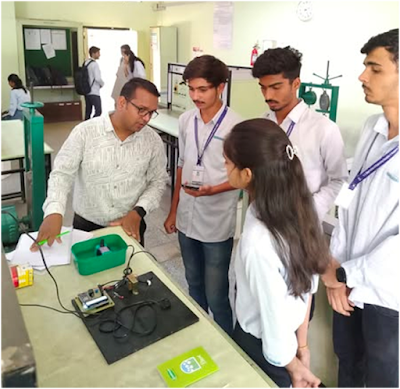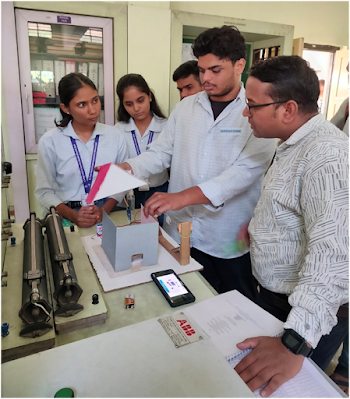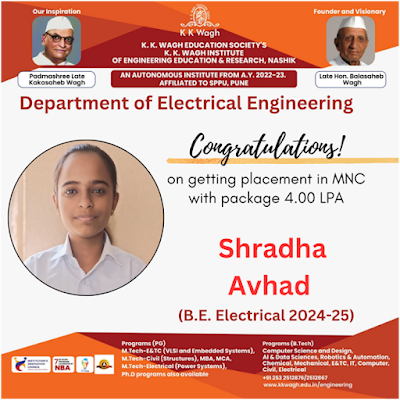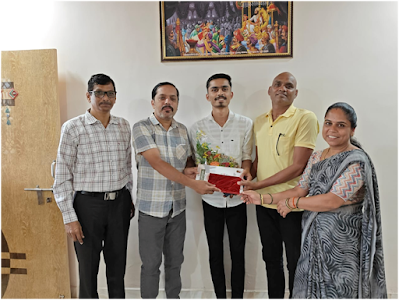HOD Corner:
It
gives me immense pleasure to present the July 2025 edition of our Department of
Electrical Engineering Newsletter. This month has been filled with enriching
activities that contributed to the academic growth, professional grooming, and
holistic development of our students.
Our
department organized multiple expert sessions and panel discussions that
provided valuable exposure to emerging technologies, automation, renewable
energy applications, and career opportunities in electrical engineering. These
initiatives have bridged the gap between classroom learning and industrial
practices, fostering confidence and curiosity among students.
We are
proud to celebrate the achievements of our students, be it securing placements,
excelling in academics, or winning championships in sports. Alumni interactions
further strengthened the bond between our department and its graduates, inspiring
current students with practical insights into career paths and industry
readiness.
I am
also delighted to witness our students’ active participation in cultural and
traditional celebrations such as Guru Purnima, which reflects their respect for
values alongside their pursuit of technical excellence.
I take
this opportunity to appreciate the dedicated efforts of faculty members,
student bodies, and alumni who contributed towards the success of this month’s
initiatives. Let us continue to work together with the same zeal and commitment
to nurture competent, responsible, and innovative electrical engineers.
Department Events:
Expert session on “Students to Engineers" by Mr. John Yesuraj, General Manager (R&D-Retired), CG Power and Industrial Solution Ltd, Nashik, on 25th July 2025
Expert session on “Technology Driven Solutions for Social Problems" by Mr. Prashant Bachhav, Owner, Arya Technologies, Nashik, on 23rd July 2025
An
Expert session has been arranged by IEEE On-Campus of the electrical department
on “Technology Driven Solutions for
social problems", Third Year Electrical Division: A and B students and staff of the
department on 23/07/2025.Resource Person was“Mr. Prashant Bachhav”, Owner, Arya Technologies, Nashik, India. Total No. of
Students present = 114. The expert session on Technology-Driven Solutions for
Social Problems highlighted the innovative technologies for societal problems.
The session focused on the role of modern tools such as IoT, AI, data
analytics, and renewable energy solutions in solving issues related to
healthcare, education, environmental sustainability, waste management, and
public safety. The expert shared real-life case studies and successful
technology implementations, encouraging students to think critically and
develop cost-effective, scalable solutions for community welfare. The lecture
inspired participants to leverage their technical knowledge to create impactful,
socially responsible innovations.
Expert session on “Control System Automation" by Mr. Sahebrao Salunke, Owner, Salunke Automation Ltd., Nashik, on 31st July 2025
An
Expert session has been arranged by the IEEE On-Campus of the electrical
department on “Control System Automation", Third Year Electrical Division: A students and staff of the department on
31/07/2025.Resource Person: “Mr.
Sahebrao Salunke” Owner, Salunke Automation Ltd., Nashik, India. Total No.
of Students present = 68. This lecture helped students acquire knowledge
regarding Control System Automation involving the use of sensors, controllers,
actuators, and software to automatically monitor, regulate, and control
industrial or mechanical processes with minimal human intervention. It
integrates technologies like PLCs, SCADA, and communication networks to ensure
efficiency, accuracy, and safety in operations. Control systems can be
open-loop, where there is no feedback, or closed-loop, where the system
continuously adjusts based on feedback from sensors. This automation enhances
productivity, reduces errors, and optimizes process performance across various
industries.
Panel Discussion on Scope and Career Opportunities for Electrical Engineers
On 12th July 2025, the Department of Electrical Engineering, K K Wagh
Institute of Engineering Education and Research. We were honored to host a
dynamic Panel Discussion that explored the Scope and Career Opportunities in
Electrical Engineering, featuring insights from industry experts and seasoned
professionals.
Esteemed Panel Members:
1. Mr. Sunil Tidke, Plant Head,
Mahindra Accelo
2. Mr. Prasad S P., Certified
International Supply Chain Professional (CISCP), Dubai
3. Mr. Pankaj Patil, Additional
Executive Engineer, MSETCL
4. Mr. Nitin Khatal, Technosys
Control Solutions, Nashik
5. Mr. Sachin Mishra, Global Product
Manager, ABB India Limited
The discussion was excellently
moderated by Ms. Rohini Dhikale, Third Year Student. The event offered valuable
insights into the evolving landscape of the electrical engineering
profession—from core industry roles to entrepreneurship, public sector
opportunities, and the
Expert session on “Testing of SCR & Transistors" by Mr. Sanjay Chaudhary, Director, Electronics Study Centre, Nashik, India, on 16th July 2025.
An
Expert session has been arranged by EFFECT On-Campus of the electrical
department on “Testing of SCR &
Transistors" Second Year Electrical Division: A and B students and staff of the department on 16/07/2025. The
Resource Person was“Mr. Sanjay Chaudhari", Director, Electronics Study Centre,
Nashik, India. Total No. of Students
present = 91. The expert session on Testing of SCR and Transistors provided
valuable insights into the practical aspects of semiconductor device testing.
The session covered the fundamental working principles of SCRs and transistors,
their characteristics, and various testing methods used to assess device
functionality and performance. Students gained hands-on knowledge about
identifying faulty components, using testing equipment such as multimeters and
curve tracers, and understanding real-world applications in power electronics
circuits. The lecture enhanced students' technical skills, bridging the gap
between theoretical learning and industrial testing practices.
Expert session on “Understanding Renewable Energy Technologies for Rural Communities” by Mr. Sanjay Trimbak Kawale, Technical Consultant – Solar Energy & Sustainable Technologies, 25th July 2025.
Department of Electrical Engineering,
under the Education and Energy
Awareness Program (EEAP), organized an expert lecture on “Understanding
Renewable Energy Technologies for Rural Communities” for T.Y. A and T.Y. B students on 25th July 2025. Resource Person: Mr.
Sanjay Trimbak Kawale, Technical Consultant – Solar Energy &
Sustainable Technologies
Total Number of Students Present:110.The expert lecture was designed to provide students
with a technically in-depth understanding of renewable energy technologies,
with a specific focus on rural and agricultural applications. The session
emphasized the practical design, standards, and implementation of solar
photovoltaic (PV) systems in residential and farming sectors, aligning
engineering knowledge with real-world needs and national development
priorities. Mr. Kawale elaborated on the design methodology for standalone and
grid-connected solar PV systems, including solar pump-based irrigation systems.
Key topics included selection of PV modules based on efficiency and climatic
conditions, system sizing using load analysis and solar insolation data,
inverter selection with MPPT logic, battery sizing based on load profiles and
autonomy days, and optimization of panel tilt angles to match seasonal solar
trajectories.
Expert session on "Recent Advancements in Synchronization Techniques” by Mr. Pramod Daspute, by Shri. Abhijit Borade, Deputy Executive Engineer, Mahagenco, on 29th July 2025
The session was delivered by Shri. Abhijit Borade, Deputy Executive Engineer, Mahagenco, shared valuable insights into modern synchronization practices and their relevance in today's power systems. His practical experience and technical depth greatly enriched the students' understanding of the subject.
Student Corner:
Student Placement:
The
following students are placed in various multinational companies.
Congratulations to all the students!
Placed
Students' Details (July 2025)
|
Sr. No. |
Name of the Student |
Package |
Placement Date |
| 1. |
Beldar Paras Prashant |
3.6 |
07/07/2025 |
|
2. |
SumitDevidasGhuge |
3 |
09/07/2025 |
|
3. |
Aditya Milind Patil |
2 |
21/07/2025 |
|
4. |
Mahesh Sanap |
2 |
21/07/2025 |
Honoring the Academic Excellence of Final Year Toppers (2024-25)!
We are delighted to announce
the toppers of Final Year Electrical Engineering (2024-25) from our department!
Heartiest
congratulations to all six students for their outstanding academic
achievements!
Wishing you all great
success in your future endeavors!
Alumni Interaction with Third-Year Students!
Alumni Interaction with Third Year Students
Guidance from Alumni: Empowering Final Year Students for Placements!
Celebrating Guru Purnima with Gratitude and Reverence
On 10th July 2025, the EFFECT Student Body of the Department of
Electrical Engineering celebrated the auspicious occasion of Guru Purnima by
seeking the blessings of our respected Principal, Deans, Heads of Departments,
and all faculty members.
This heartfelt gesture was led by student representatives:
Omkar Jadhav, Ankita Karanjkar, Soham Parwate,
Akanksha Khandekar, Shravani Shelke, and Atharva Bhagare, who expressed deep respect and appreciation for
the invaluable guidance of their mentors. Guru Purnima is a day to honour those
who illuminate our paths with wisdom. We are proud of our students for
upholding this tradition with sincerity and warmth.
Victory Alert!
We are proud to announce that
Team Electrical has emerged as the champion of the Karmaveer Premier League,
held on 29th July 2025!
This is a moment of immense pride and joy for all of us. The team's
dedication, teamwork, and sportsmanship truly stood out throughout the
tournament.
👏 Congratulations to all the team members for this well-deserved
victory:
🔹 Dev Pagare – Captain
🔹
Vishal Nikumbh – Vice Captain
🔹 Om
Ippar
🔹
RohitSanap
🔹
ParthWarhade
🔹
Piyush Jadhav
🔹
Tejas Wagh
🔹
AshwinDhanage
🔹
Bhagesh Ahire
🔹
Harshal Patil
🔹
ShilwanChavhan
Your energy on the field and unity off the field made this win possible.
Here's to many more victories ahead! 🥳🎉
Hyderabad Alumni Meet | 26th July 2025
Such meetings strengthen the bond between our institute and its alumni, inspiring current students and fostering new collaborations.
Student Article:
Industry Visit to Salunke Automation Private Limited
Gaikwad Harshad Sachin TE-A
(Electrical) hsgaikwad370623@kkwagh.edu.in
Company Profile:
Name of company
Founder: Mr. Sahebrao Salunke and Miss. Monal Salunke
Title: The visit to “Salunke Automation Private
Limited” Company under the Course Industry Connect ( IC )
Introduction:
Industrial
visits play a crucial role in bridging the gap between theoretical knowledge
acquired through academic curriculum and practical exposure to real-world
industrial operations.
Recognizing the importance of this experiential learning, an industrial visit
was organized for the students of Third Year (TY) as part of the Industry
Connect Course to Salunke Automation Pvt. Ltd., located at MIDC Ambad, Nashik,
on 21st April 2025.
Salunke
Automation Pvt. Ltd. is a reputed organization in the field of industrial
automation, specializing in the design, manufacturing, and testing of a wide
range of electrical panels and automation solutions. The visit was aimed at
providing students with first-hand experience of how theoretical concepts such
as electrical drives, automation systems, and control panels are practically
implemented in an industrial setting.
The visit
was meticulously coordinated by Mr. Atul Shewale and Dr. Saravanan S, who
ensured smooth execution of the plan. Students were guided through various
departments of the company where they observed the detailed processes involved
in the design, assembly, wiring, and quality testing of products such as VFD
panels, AC/DC drive panels, APFC panels, AMF panels, MCC panels, PCC panels,
PLC control RIO panels, and railway relay assemblies.
Through
this visit, students were introduced to real-time industrial challenges, safety
practices, technical standards, and quality assurance protocols, enhancing
their understanding of the practical aspects of their academic studies.
The
experience provided valuable insights into current industrial trends, new
technologies, and the importance of precision and reliability in the automation
sector.
Objectives: The
main objectives of the industrial visit were
2. To understand the complete
process involved in the manufacturing, assembly, and testing of various types
of control panels and drive systems.
3. To observe the implementation of
safety practices, quality standards, and testing protocols in the industrial
setting.
4. To familiarize students with the
latest technological advancements in the field of industrial automation.
5. To encourage students to pursue
careers and further research in automation, power systems, and industrial
electronics.
Vision: Salunke
Automation strives to provide world-class technology with utmost satisfaction to
all the clients and uphold the principles of business ethics by giving the best
services across the industry. We will be regarded as one of the best companies
in our field of work.
Mission: To
evolve as a leading Automation company, by providing unmatched quality,
products, innovations and services, in all fields of instrumentation and
automation at the most competitive prices and always surpassing the customer
expectations to keep our customers always satisfied.
Key Learnings from the Visit:
1. AC/DC Drive Panels
and VFD Panels: Students were introduced to the
working of AC and DC drive systems.
4. APFC Panels: Students
learned about Automatic Power Factor Correction (APFC) panels, which are
used to automatically improve the power factor of electrical systems by
switching capacitors in and out based on load requirements. Maintaining an
ideal power factor helps industries reduce electricity bills and penalties, and
ensures efficient energy usage.
Conclusion:
The industrial visit to Salunke
Automation Pvt. Ltd. was an immensely valuable learning experience for all
the students. It provided a practical perspective on the theoretical concepts
taught in the classroom, especially related to electrical drives, automation
systems, and control panel manufacturing. Observing the design, assembly, and
testing processes of various panels, such as VFD panels, AC/DC drive panels,
APFC panels, AMF panels, MCC panels, PCC panels, and PLC control RIO panels,
deepened the students' understanding of industry standards, safety practices,
and technological advancements. The exposure to relay interfacing modules and
railway relay assembly work highlighted the precision and quality assurance
necessary for critical applications. Overall, the visit not only enhanced
technical knowledge but also fostered an appreciation for professionalism,
teamwork, and the importance of quality control in industrial environments.
Such real-world learning opportunities are instrumental in preparing students
for their future roles as engineers and innovators in the automation and
electrical engineering sectors.
Name of company Founder: Mr. Sahebrao Salunke and Miss. Monal Salunke
Title: The visit to “Salunke Automation Private Limited” Company under the Course Industry Connect ( IC )
Introduction:
Industrial visits play a crucial role in bridging the gap between theoretical knowledge acquired through academic curriculum and practical exposure to real-world industrial operations.
Recognizing the importance of this experiential learning, an industrial visit was organized for the students of Third Year (TY) as part of the Industry Connect Course to Salunke Automation Pvt. Ltd., located at MIDC Ambad, Nashik, on 21st April 2025.
Salunke Automation Pvt. Ltd. is a reputed organization in the field of industrial automation, specializing in the design, manufacturing, and testing of a wide range of electrical panels and automation solutions. The visit was aimed at providing students with first-hand experience of how theoretical concepts such as electrical drives, automation systems, and control panels are practically implemented in an industrial setting.
The visit was meticulously coordinated by Mr. Atul Shewale and Dr. Saravanan S, who ensured smooth execution of the plan. Students were guided through various departments of the company where they observed the detailed processes involved in the design, assembly, wiring, and quality testing of products such as VFD panels, AC/DC drive panels, APFC panels, AMF panels, MCC panels, PCC panels, PLC control RIO panels, and railway relay assemblies.
Through this visit, students were introduced to real-time industrial challenges, safety practices, technical standards, and quality assurance protocols, enhancing their understanding of the practical aspects of their academic studies.
The experience provided valuable insights into current industrial trends, new technologies, and the importance of precision and reliability in the automation sector.
Objectives: The main objectives of the industrial visit were
2. To understand the complete process involved in the manufacturing, assembly, and testing of various types of control panels and drive systems.
3. To observe the implementation of safety practices, quality standards, and testing protocols in the industrial setting.
4. To familiarize students with the latest technological advancements in the field of industrial automation.
5. To encourage students to pursue careers and further research in automation, power systems, and industrial electronics.
Vision: Salunke Automation strives to provide world-class technology with utmost satisfaction to all the clients and uphold the principles of business ethics by giving the best services across the industry. We will be regarded as one of the best companies in our field of work.
Mission: To evolve as a leading Automation company, by providing unmatched quality, products, innovations and services, in all fields of instrumentation and automation at the most competitive prices and always surpassing the customer expectations to keep our customers always satisfied.
1. AC/DC Drive Panels and VFD Panels: Students were introduced to the working of AC and DC drive systems.
4. APFC Panels: Students learned about Automatic Power Factor Correction (APFC) panels, which are used to automatically improve the power factor of electrical systems by switching capacitors in and out based on load requirements. Maintaining an ideal power factor helps industries reduce electricity bills and penalties, and ensures efficient energy usage.
The industrial visit to Salunke Automation Pvt. Ltd. was an immensely valuable learning experience for all the students. It provided a practical perspective on the theoretical concepts taught in the classroom, especially related to electrical drives, automation systems, and control panel manufacturing. Observing the design, assembly, and testing processes of various panels, such as VFD panels, AC/DC drive panels, APFC panels, AMF panels, MCC panels, PCC panels, and PLC control RIO panels, deepened the students' understanding of industry standards, safety practices, and technological advancements. The exposure to relay interfacing modules and railway relay assembly work highlighted the precision and quality assurance necessary for critical applications. Overall, the visit not only enhanced technical knowledge but also fostered an appreciation for professionalism, teamwork, and the importance of quality control in industrial environments. Such real-world learning opportunities are instrumental in preparing students for their future roles as engineers and innovators in the automation and electrical engineering sectors.

























































